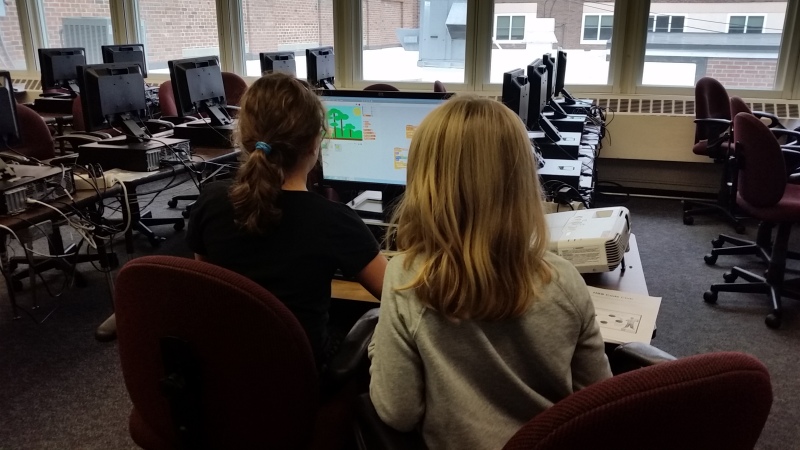Overall, I’m loving the independent projects that my two Code Club groups have chosen to create for their showcases. They are working hard, mostly, and progressing. As project manager, I’m not stressing about the coding that is happening.

Pair programming at recess
So instead of writing about managing the coding, I’d like to talk about behavior management. Here’s some things I’ve noticed:
- Code Club can be loud. Scratchers want to listen to their sound assets and want others to listen, too.
- Scratchers want to sit by their friends and share what they are doing.
- Scratchers want to have fun while they are learning and
- Ten-year olds enjoy the silliest things.
I don’t find anything wrong with these things. This is an after school club, not a classroom. I enjoy the energy and enthusiasm of a room full of Scratchers. However I do need to have control of the energy level and keep the chaos in the “fun” realm. I know what level of noise I can stand and manage. There are also some behaviors that push my buttons and times when I miss catching behaviors before they create problems.
Here’s a couple of things I work towards:
- Develop a routine. This is important enough to spend valuable time on. We gather at the beginning in a group, even if I’m not introducing anything. We check in with each other and set a plan for the 75 minutes. It helps settle the students into the club. I’d like to be better at setting up a routine at the end. I’m usually working with students on last minute coding crises right up until the parents show up.
- Get to know the students. I know the HSS Code Club students and they know me – we see each other at school but the students from my other club I have to get to know quickly. They don’t know me either.
- Set expectations. While we go over expectations during our first meeting, I rarely restate them unless something comes up. I do expect everyone to follow school rules, and respect others. “Friendly reminders” about those rules can serve as a warning.
- Be yourself. I’ve seen and tried a number of different classroom management styles. Some work for me and others don’t feel genuine when I use them.
For all that I’m a generally upbeat, cheery person, I do get grumpy and irritated. Too much noise makes it difficult to work on coding. Spinning around in the chairs or messing with the things in the computer lab – not okay. Playing with the whiteboard until it flakes out, argh (This issue became a discussion point at the beginning of the next meeting). Deleting someone’s code – hasn’t really happened on purpose but apologies must be made. I had to remove a student from Code Club one day, but we worked it out and the student was able to return the next week. I have to thank the school staff and administrators for their support for this one.
To close, I’ll state that every issue is different and, while I don’t always handle them as best as I could, there are not enough switch statements to code responses to all possible behaviors. In fact, I don’t think Scratch has switch/case statements.
Classroom management is probably the hardest thing about teaching.
LikeLiked by 1 person
I just finished a middle school code club. I am a high school teacher and techie. I do not work with middle schoolers. It was an experience. Luckily there were only 4 kids in the club and they were all well above average intellectually but it still required a big shift on my part. Language, speed, maintaining their focus without being over controlling, and letting them explore dead ends were all part of the shift for me. Working at the middle school definitely requires more planning that I would do with high school group. It was still fun.
LikeLike